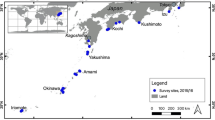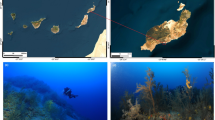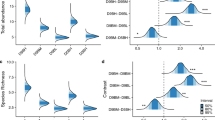Abstract
The Pacific epizoic brittle star Ophiothela mirabilis Verrill, 1867 has widely spread and colonized hosts at high densities along the Western Atlantic. We assessed the impacts of O. mirabilis on the feeding performance of the preferred host Leptogorgia punicea (Milne Edwards and Haime, 1857) through in situ experiments using incubation chambers and estimated its putative effects on the benthic-pelagic coupling processes of a rocky shore system. The feeding rates and heterotrophic carbon inputs of L. punicea treatments with high colonization by O. mirabilis (5.4 ± 0.6 individuals cm−2 of host area; mean ± standard deviation) were compared to host controls naturally without brittle stars. No significant differences in host feeding performance were observed between the control and treatments. Overall, L. punicea ingested 3,047,118 ± 1,843,183 particles g DW (dry weight)−1 h−1, corresponding to 116.1 ± 159.0 µg of carbon (C) g DW−1 h−1. Therefore, although octocorals hosting O. mirabilis may have impaired polyp opening and extension, their feeding performance remains similar. In this sense, the impact of O. mirabilis on the carbon flux of the rocky shore system driven by octocoral ingestion is minimal. The grazing rate of 49.9 ± 68.3 mg C m−2 day−1 highlights the significant role of L. punicea in such benthic-pelagic coupling processes. Notwithstanding, further laboratory and field experimental studies assessing the effects on host taxa with distinct morphological and functional features are needed to better understand the responses of the recipient hard-bottom systems along the Western Atlantic to increasing densities of O. mirabilis.








Similar content being viewed by others
References
Araújo JT, Oliveira MO, Matthews-Cascon H, Correia FAC (2018) The invasive brittle star Ophiothela mirabilis Verrill, 1867 (Echinodermata, Ophiuroidea) in the southwestern Atlantic: filling gaps of distribution, with comments on an octocoral host. Lat Am J Aquat Res 46:1123–1127. https://doi.org/10.3856/vol46-issue5-fulltext-25
Blackburn TM, Pyšek P, Bacher S et al (2011) A proposed unified framework for biological invasions. Trends Ecol Evol 26:333–339. https://doi.org/10.1016/j.tree.2011.03.023
Blackburn TM, Essl F, Evans T et al (2014) A unified classification of alien species based on the magnitude of their environmental impacts. PLoS Biol 12:e1001850. https://doi.org/10.1371/journal.pbio.1001850
Castro CB, Medeiros MS, Loiola LL (2010) Octocorallia (Cnidaria: Anthozoa) from Brazilian reefs. J Nat Hist 44:763–827. https://doi.org/10.1080/00222930903441160
Coppari M, Gori A, Rossi S (2014) Size, spatial, and bathymetrical distribution of the ascidian Halocynthia papillosa in Mediterranean coastal bottoms: benthic–pelagic coupling implications. Mar Biol 161:2079–2095. https://doi.org/10.1007/s00227-014-2488-5
Coppari M, Gori A, Viladrich N et al (2016) The role of Mediterranean sponges in benthic-pelagic coupling processes: Aplysina aerophoba and Axinella polypoides case studies. J Exp Mar Bio Ecol 477:57–68. https://doi.org/10.1016/j.jembe.2016.01.004
Coppari M, Zanella C, Rossi S (2019) The importance of coastal gorgonians in the blue carbon budget. Sci Rep 9:13550. https://doi.org/10.1038/s41598-019-49797-4
Dalgaard P (2008) Introductory Statistics with R. Springer, New York, NY. https://doi.org/10.1007/978-0-387-79054-1
Derviche P, Saucsen A, Spier D, Lana P (2021) Distribution patterns and habitat suitability of the non-native brittle star Ophiothela mirabilis Verrill, 1867 along the Western Atlantic. J Sea Res 168:101994. https://doi.org/10.1016/j.seares.2020.101994
Fabricius KE, Genin A, Benayahu Y (1995) Flow‐dependent herbivory and growth in zooxanthellae‐free soft corals. Limnol Oceanogr 40:1290–1301. https://doi.org/10.4319/lo.1995.40.7.1290
Ferry R, Hubert L, Philippot V, Priam F, Smith J (2020) First record of the non-indigenous brittle star species Ophiothela mirabilis Verrill, 1867 (Echinodermata: Ophiuroidea), off Martinique Island. French Lesser Antilles Bioinvasions Rec 9:228–238. https://doi.org/10.3391/bir.2020.9.2.08
Frost B (1972) Effects of size and concentration of food particles on the feeding behavior of the marine planktonic copepod Calanus pacificus. Limnol Oceanogr 17:805–815. https://doi.org/10.4319/lo.1972.17.6.0805
Gili JM, Coma R (1998) Benthic suspension feeders: their paramount role in littoral marine food webs. Trends Ecol Evol 13:316–321. https://doi.org/10.1016/S0169-5347(98)01365-2
Girard F, Fu B, Fisher CR (2016) Mutualistic symbiosis with ophiuroids limited the impact of the Deepwater Horizon oil spill on deep-sea octocorals. Mar Ecol Prog Ser 549:89–98. https://doi.org/10.3354/meps11697
Glynn PW, Coffman B, Primov K et al (2019) Benthic ctenophore (Order Platyctenida) reproduction, recruitment, and seasonality in South Florida. Invertebr Biol 138:e12256. https://doi.org/10.1111/ivb.12256
Glynn PW, Alitto R, Dominguez J et al (2020) A tropical eastern Pacific invasive brittle star species (Echinodermata: Ophiuroidea) reaches Southeastern Florida. Adv Mar Biol 87:443–472. https://doi.org/10.1016/bs.amb.2020.08.010
Glynn PW, Coffman B, Dettloff K et al (2021a) Non-native brittle star interactions with native octocoral epizoites: an endemic benthic ctenophore in peril? Mar Biol 168:1–12. https://doi.org/10.1007/s00227-021-03927-7
Glynn PW, Gillette PR, Dettloff K et al (2021b) Experimental evidence of minimal effects on octocoral hosts caused by the introduced ophiuroid Ophiothela mirabilis. Coral Reefs. https://doi.org/10.1007/s00338-021-02067-0
Goldberg WM (2018) Coral food, feeding, nutrition, and secretion: a review. Marine organisms as model systems in biology and medicine. Springer, Cham, pp 377–421
Grange KR (1991) Mutualism between the antipatharian Antipathes fiordensis and the ophiuroid Astrobrachion constrictum in New Zealand fjords. Hydrobiologia 216–217:297–303. https://doi.org/10.1007/BF00026478
Granja-Fernández R, Herrero-Pérezrul MD, López-Pérez RA et al (2014) Ophiuroidea (Echinodermata) from coral reefs in the Mexican Pacific. Zookeys 406:101–145. https://doi.org/10.3897/zookeys.406.6306
Hendler G (1984) The association of Ophiothrix lineata and Callyspongia vaginalis: a brittlestar-sponge cleaning symbiosis? Mar Ecol 5:9–27. https://doi.org/10.1111/j.1439-0485.1984.tb00304.x
Hendler G, Littman BS (1986) The ploys of sex: relationships among the mode of reproduction, body size and habitats of coral-reef brittlestars. Coral Reefs 5:31–42. https://doi.org/10.1007/BF00302169
Hendler G, Grygier MJ, Maldonado E, Denton J (1999) Babysitting brittle stars: heterospecific symbiosis between ophiuroids (Echinodermata). Invertebr Biol 118:190–201. https://doi.org/10.2307/3227060
Hendler G, Migotto AE, Ventura CRR, Wilk L (2012) Epizoic Ophiothela brittle stars have invaded the Atlantic. Coral Reefs 31:1005–1005. https://doi.org/10.1007/s00338-012-0936-6
Johnson SK, Hallock P (2020) A review of symbiotic gorgonian research in the western Atlantic and Caribbean with recommendations for future work. Coral Reefs 39:239–258. https://doi.org/10.1007/s00338-020-01891-0
Jones CG, Lawton JH, Shachak M (1994) Organisms as ecosystem engineers. Oikos 69:373–386. https://doi.org/10.2307/3545850
Kahn AS, Yahel G, Chu JWF et al (2015) Benthic grazing and carbon sequestration by deep-water glass sponge reefs. Limnol Oceanogr 60:78–88. https://doi.org/10.1002/lno.10002
LaJeunesse TC (2020) Zooxanthellae. Curr Biol 30:PR1110–R1113. https://doi.org/10.1016/j.cub.2020.03.058
Lane SJ, Tobalske BW, Moran AL et al (2018) Costs of epibionts on Antarctic sea spiders. Mar Biol 165:1–8. https://doi.org/10.1007/s00227-018-3389-9
Lawley JW, Fonseca AC, Faria Júnior E, Lindner A (2018) Occurrence of the non-indigenous brittle star Ophiothela cf. mirabilis Verrill, 1867 (Echinodermata, Ophiuroidea) in natural and anthropogenic habitats off Santa Catarina, Brazil. Check List 14:453–459. https://doi.org/10.15560/14.2.453
Lombard F, Boss E, Waite AM et al (2019) Globally consistent quantitative observations of planktonic ecosystems. Front Mar Sci. https://doi.org/10.3389/fmars.2019.00196
Mantelatto MC, Vidon LF, Silveira RB et al (2016) Host species of the non-indigenous brittle star Ophiothela mirabilis (Echinodermata: Ophiuroidea): an invasive generalist in Brazil? Mar Biodivers Rec 9:1–7. https://doi.org/10.1186/s41200-016-0013-x
Martinez AS, Mayer-pinto M, Christofoletti RA (2019) Functional responses of filter feeders increase with elevated metal contamination: Are these good or bad signs of environmental health? Mar Pollut Bull 149:110571. https://doi.org/10.1016/j.marpolbul.2019.110571
Mekhova ES, Martynov AV, Britayev TA (2018) Host selection and host switching in Gymnolophus obscura—a symbiotic ophiuroid associated with feather stars (Crinoidea: Comatulida). Symbiosis 76:313–320. https://doi.org/10.1007/s13199-018-0566-z
Montagnes DJS, Berges JA, Harrison PJ, Taylor FJR (1994) Estimating carbon, nitrogen, protein, and chlorophyll a from volume in marine phytoplankton. Limnol Oceanogr 39:1044–1060. https://doi.org/10.4319/lo.1994.39.5.1044
Mosher CV, Watling L (2009) Partners for life: a brittle star and its octocoral host. Mar Ecol Prog Ser 397:81–88. https://doi.org/10.3354/meps08113
Ohtsuka S, Kondo Y, Sakai Y et al (2010) In-situ observations of symbionts on medusae occurring in Japan Thailand Indonesia and Malaysia. Bull Hiroshima Univ Museum 2:9–18. https://doi.org/10.15027/32060
Picciano M, Ferrier-Pagès C (2007) Ingestion of pico- and nanoplankton by the Mediterranean red coral Corallium rubrum. Mar Biol 150:773–782. https://doi.org/10.1007/s00227-006-0415-0
Pile AJ, Young CM (2006) The natural diet of a hexactinellid sponge: benthic-pelagic coupling in a deep-sea microbial food web. Deep Res Part I Oceanogr Res Pap 53:1148–1156. https://doi.org/10.1016/j.dsr.2006.03.008
Pile A, Patterson M, Witman J (1996) In situ grazing on plankton less than 10 micrometer by the boreal sponge Mycale lingua. Mar Ecol Prog Ser 141:95–102. https://doi.org/10.3354/meps141095
R Development Core Team (2021) R: a language and environment for statistical computing. R Foundation for Statistical Computing, Vienna
Ribes M, Coma R, Gili JM (1998) Seasonal variation of in situ feeding rates by the temperate ascidian Halocynthia papillosa. Mar Ecol Prog Ser 175:201–213. https://doi.org/10.3354/meps175201
Ribes M, Coma R, Rossi S (2003) Natural feeding of the temperate asymbiotic octocoral-gorgonian Leptogorgia sarmentosa (Cnidaria: Octocorallia). Mar Ecol Prog Ser 254:141–150. https://doi.org/10.3354/meps254141
Ribes M, Coma R, Gili JM, et al. (2000) A “semi-closed” recirculating system for the in situ study of feeding and respiration of benthic suspension feeders. Sci Mar 64:265–275. https://doi.org/10.3989/scimar.2000.64s1265
Rich L-P, Dennis MM, Freeman MA (2020) New record of the non-native Ophiothela mirabilis (Verrill 1867) in St. Kitts, West Indies. Adv Oceanogr Mar Biol 2:2–6. https://doi.org/10.33552/AOMB.2020.02.000526
Rinkevich B (1996) Do reproduction and regeneration in damaged corals compete for energy allocation? Mar Ecol Prog Ser 143:297–302. https://doi.org/10.3354/meps143297
Rossi S, Ribes M, Coma R, Gili JM (2004) Temporal variability in zooplankton prey capture rate of the passive suspension feeder Leptogorgia sarmentosa (Cnidaria: Octocorallia), a case study. Mar Biol 144:89–99. https://doi.org/10.1007/s00227-003-1168-7
Rossi S, Schubert N, Brown D et al (2020) Trophic ecology of Caribbean octocorals: autotrophic and heterotrophic seasonal trends. Coral Reefs 39:433–449. https://doi.org/10.1007/s00338-020-01906-w
Roth F, Wild C, Carvalho S et al (2019) An in situ approach for measuring biogeochemical fluxes in structurally complex benthic communities. Methods Ecol Evol 10:712–725. https://doi.org/10.1111/2041-210X.13151
Saiz E (1993) Sources of variability in zooplankton feeding experiments: the importance of accurate determination of algal growth rates. Sci Mar 57: 23–29
Schubert N, Brown D, Rossi S (2016) Symbiotic versus non-symbiotic octocorals: physiological and ecological implications. In: Rossi S, Bramanti L, Gori A, Orejas C (eds) Marine Animal Forests. Springer, Cham. https://doi.org/10.1007/978-3-319-17001-5_54-1
Stevens GC (1987) Lianas as structural parasites: the Bursera simaruba example. Ecol Soc Am 68:77–81. https://doi.org/10.2307/1938806
Tavares MR, Costa PAS, Ventura CRR (2019) Population size structure, asexual reproduction, and somatic growth estimates of the non-indigenous brittle star Ophiothela mirabilis (Echinodermata: Ophiuroidea) on the southeastern coast of Brazil. Mar Biodivers 49:1713–1725. https://doi.org/10.1007/s12526-019-00938-y
Trygonis V, Sini M (2012) PhotoQuad: a dedicated seabed image processing software, and a comparative error analysis of four photoquadrat methods. J Exp Mar Bio Ecol 424–425:99–108. https://doi.org/10.1016/j.jembe.2012.04.018
Tsounis G, Rossi S, Laudien J et al (2006) Diet and seasonal prey capture rates in the Mediterranean red coral (Corallium rubrum L.). Mar Biol 149:313–325. https://doi.org/10.1007/s00227-005-0220-1
Tsounis G, Martinez L, Bramanti L et al (2012) Anthropogenic effects on reproductive effort and allocation of energy reserves in the Mediterranean octocoral Paramuricea clavata. Mar Ecol Prog Ser 449:161–172. https://doi.org/10.3354/meps09521
Verity PG, Robertson CY, Tronzo CR, Andrews MG, Nelson JR, Sieracki ME (1992) Relationships between cell volume and the carbon and nitrogen content of marine photosynthetic nanoplankton. Limnol Oceanogr 37:1434–1446. https://doi.org/10.4319/lo.1992.37.7.1434
Acknowledgements
We are grateful to Rubens Lopes for the use of the Planktonic Systems Laboratory and to Aline Martinez and Luciana Frazão for discussing laboratory techniques and procedures with us. We thank the Center of Marine Studies of Federal University of Paraná for logistical support. Biological samples were studied and collected under Biodiversity Information and Authorization System (SISBIO) license number 68918.
Funding
This study was funded by the Brazilian National Council for Scientific and Technological Development—CNPq (307047/2018–0) through a research grant to PL. PD was funded by the Coordination for the Improvement of Higher Education Personnel (CAPES) social demand scholarship.
Author information
Authors and Affiliations
Corresponding author
Ethics declarations
Conflict of interest
The authors declare that they have no known competing financial interests or personal relationships that could have appeared to influence the work reported in this paper.
Data and code availability
The datasets and the R codes of the current study are available in the GitHub repository, https://github.com/pderviche/Ophiothela_mirabilis_Impacts.
Additional information
Publisher's Note
Springer Nature remains neutral with regard to jurisdictional claims in published maps and institutional affiliations.
Rights and permissions
About this article
Cite this article
Derviche, P., da Cunha Lana, P. The effects of the nonnative brittle star Ophiothela mirabilis Verrill, 1867 on the feeding performance of an octocoral host in a southwestern Atlantic rocky shore. Biol Invasions 24, 2821–2833 (2022). https://doi.org/10.1007/s10530-022-02815-5
Received:
Accepted:
Published:
Issue Date:
DOI: https://doi.org/10.1007/s10530-022-02815-5




